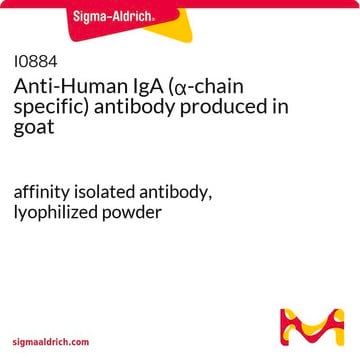HPA006367
Anti-PCYT1B antibody produced in rabbit
Prestige Antibodies® Powered by Atlas Antibodies, affinity isolated antibody, buffered aqueous glycerol solution
Synonym(s):
Anti-CCT B antibody produced in rabbit, Anti-CCT-β antibody produced in rabbit, Anti-CT B antibody produced in rabbit, Anti-CTP:phosphocholine cytidylyltransferase B antibody produced in rabbit, Anti-Choline-phosphate cytidylyltransferase B antibody produced in rabbit, Anti-Phosphorylcholine transferase B antibody produced in rabbit
Select a Size
$598.00
Estimated to ship onApril 12, 2025
Select a Size
About This Item
$598.00
Estimated to ship onApril 12, 2025
Recommended Products
biological source
rabbit
Quality Level
conjugate
unconjugated
antibody form
affinity isolated antibody
antibody product type
primary antibodies
clone
polyclonal
product line
Prestige Antibodies® Powered by Atlas Antibodies
form
buffered aqueous glycerol solution
species reactivity
human
technique(s)
immunohistochemistry: 1:20- 1:50
immunogen sequence
PVVTTDAESETGIPKSLSNEPPSETMEEIEHTCPQPRLTLTAPAPFADETNCQCQAPHEKLTIAQARLGTPADRPVRVYADGIFDLFHSGHARALMQAKTLFPNSYLLVGV
UniProt accession no.
shipped in
wet ice
storage temp.
−20°C
target post-translational modification
unmodified
Gene Information
human ... PCYT1B(9468)
General description
Immunogen
Application
Biochem/physiol Actions
Features and Benefits
Every Prestige Antibody is tested in the following ways:
- IHC tissue array of 44 normal human tissues and 20 of the most common cancer type tissues.
- Protein array of 364 human recombinant protein fragments.
Linkage
Physical form
Legal Information
Disclaimer
Not finding the right product?
Try our Product Selector Tool.
Storage Class
10 - Combustible liquids
wgk_germany
WGK 1
flash_point_f
Not applicable
flash_point_c
Not applicable
ppe
Eyeshields, Gloves, multi-purpose combination respirator cartridge (US)
Choose from one of the most recent versions:
Certificates of Analysis (COA)
Don't see the Right Version?
If you require a particular version, you can look up a specific certificate by the Lot or Batch number.
Already Own This Product?
Find documentation for the products that you have recently purchased in the Document Library.
Active Filters
Our team of scientists has experience in all areas of research including Life Science, Material Science, Chemical Synthesis, Chromatography, Analytical and many others.
Contact Technical Service







